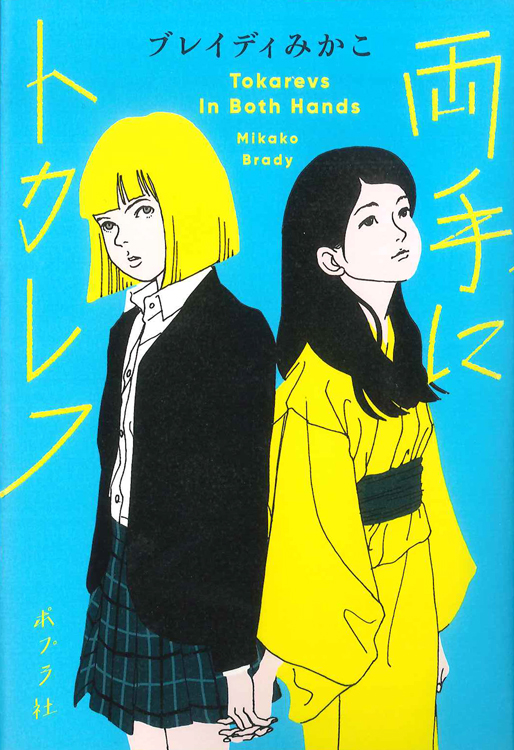[195th] "Tokarev in Both Hands" by Mikako Brady, Poplar Publishing
Known as the "original charismatic bookseller," DAIKANYAMA TSUTAYA BOOKS, who recommends books in a variety of media including magazines and TV.
In this series, we take a peek into the "bookshelves" in the mind of our most popular concierge.
Please enjoy it along with his comments.
* * * * * * * *
"Tokarevs in both hands"
Mikako Brady/Poplar Publishing
Click on the image to go to the purchase page.
Click on the image to go to the purchase page.
* * * * * * * *
This is the first novel by Mikako Brady, whose best-selling book "I'm Yellow, White and a Little Blue" is a must-read.
Mia, a middle school student living in the southeast of England, lives with her mother and brother. Her mother is having problems, and her siblings struggle to get food. One day, while spending the day at the library trying to keep warm, she happens to get into an elevator whose door is open. It was a rare occurrence in Mia's life for a door to open to her.
By chance, she comes across the autobiography of a Japanese woman named Fumiko Kaneko, who also dreams of a "door to another world."
Mia's mother spends her welfare money on drugs. Her younger brother is still young and gets bullied. Zoe volunteers with the poor and cares for the family. Will, a classmate who loves music and wants to put Mia's poetry to rap, and many other characters appear in the story. Fumiko's autobiography is inserted between these characters and the story progresses.
A scene that an ordinary writer would write passionately, saying, "Now, this is a big deal," is written casually. It is so flat that many people may wonder if such a thing even came up in the story.
For example, Mia's mother once tried to get her to snort a white powder when she was seven or eight years old, telling her that drugs would keep her from getting hungry.
Nothing more is written. So the rest is just my opinion, but whether her desire to use it all herself won out, or her last bit of sanity prevented her from doing such a thing to her child, Mia grew up clean. But I think there are many young children out there whose parents have become addicted to drugs.
There is a scene where Mia looks out from the kitchen at the cars that have come to her apartment complex at night, and remembers her childhood. I loved those lights. The golden lights shining on the walls of the apartment complex and spinning around made me feel like I was in a traveling amusement park at night, and I was happy about that. But now that I'm 14, I understand what it means when police cars and ambulances rush to my aid. At this time of day, it's either domestic violence or an overdose.
What is shocking is that Mia then starts reading Fumiko's autobiography as if nothing had happened. To her, the view outside is ordinary. It is the book that makes her anxious, wondering what happened and what will happen next.
There is also a scene where they think about the "girls who disappear from the housing complex." They are all heading for London. Some are found and brought back. But most of them don't come back. Mia thinks that if they go, something will work out.
As I read it, I wanted to scream out: Perhaps the girls have disappeared from London too, and more likely they are in the darkness, no one can trace them anymore.
Brady writes about these kinds of scenes casually. This book is not a "problem-raising" thickly covered in oil paint. It is "everyday life" vividly depicted with a black, pointed pencil. That's why it is all the more serious.
I like the scene where Will, who grew up in a comfortable middle-class family and writes rap songs, is shocked at how real Mia's words are compared to the "badass and dope" lyrics that his friends "come up with." I think all readers will probably feel the same way about this book.
A work written using a live voice.
Mia, a middle school student living in the southeast of England, lives with her mother and brother. Her mother is having problems, and her siblings struggle to get food. One day, while spending the day at the library trying to keep warm, she happens to get into an elevator whose door is open. It was a rare occurrence in Mia's life for a door to open to her.
By chance, she comes across the autobiography of a Japanese woman named Fumiko Kaneko, who also dreams of a "door to another world."
Mia's mother spends her welfare money on drugs. Her younger brother is still young and gets bullied. Zoe volunteers with the poor and cares for the family. Will, a classmate who loves music and wants to put Mia's poetry to rap, and many other characters appear in the story. Fumiko's autobiography is inserted between these characters and the story progresses.
A scene that an ordinary writer would write passionately, saying, "Now, this is a big deal," is written casually. It is so flat that many people may wonder if such a thing even came up in the story.
For example, Mia's mother once tried to get her to snort a white powder when she was seven or eight years old, telling her that drugs would keep her from getting hungry.
Nothing more is written. So the rest is just my opinion, but whether her desire to use it all herself won out, or her last bit of sanity prevented her from doing such a thing to her child, Mia grew up clean. But I think there are many young children out there whose parents have become addicted to drugs.
There is a scene where Mia looks out from the kitchen at the cars that have come to her apartment complex at night, and remembers her childhood. I loved those lights. The golden lights shining on the walls of the apartment complex and spinning around made me feel like I was in a traveling amusement park at night, and I was happy about that. But now that I'm 14, I understand what it means when police cars and ambulances rush to my aid. At this time of day, it's either domestic violence or an overdose.
What is shocking is that Mia then starts reading Fumiko's autobiography as if nothing had happened. To her, the view outside is ordinary. It is the book that makes her anxious, wondering what happened and what will happen next.
There is also a scene where they think about the "girls who disappear from the housing complex." They are all heading for London. Some are found and brought back. But most of them don't come back. Mia thinks that if they go, something will work out.
As I read it, I wanted to scream out: Perhaps the girls have disappeared from London too, and more likely they are in the darkness, no one can trace them anymore.
Brady writes about these kinds of scenes casually. This book is not a "problem-raising" thickly covered in oil paint. It is "everyday life" vividly depicted with a black, pointed pencil. That's why it is all the more serious.
I like the scene where Will, who grew up in a comfortable middle-class family and writes rap songs, is shocked at how real Mia's words are compared to the "badass and dope" lyrics that his friends "come up with." I think all readers will probably feel the same way about this book.
A work written using a live voice.
* * * * * * * *
(Redirects to Yahoo! Shopping)

DAIKANYAMA TSUTAYA BOOKS Literature Concierge
Michiko Mamuro
【profile】
She is the "original charismatic bookseller" who recommends books in various media such as magazines and TV. She has a serial in the magazine "Fujingaho", the online magazine "Tabiiro TABIIRO", and Asahi Shimbun Digital's "Honya no Hon". She is also active as a book critic, and her paperback commentaries include "Tiny Stories" (Yamada Eimi/Bunshun Bunko), "Motherhood" (Minato Kanae/Shincho Bunko), "Meandering Moon" (Sakuragi Shino/Futaba Bunko), and "Staph" (Michio Shusuke/Bunshun Bunko).
























